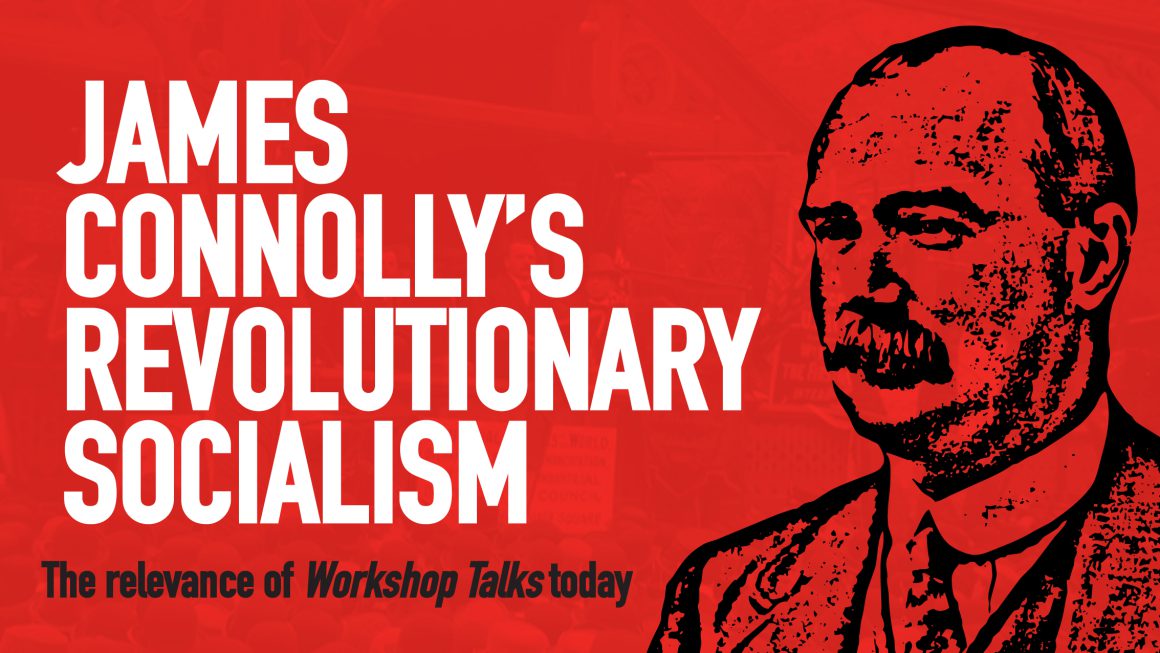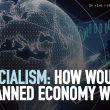The relevance of Workshop Talks today
By Kevin Henry and Eddie McCabe
We live in turbulent times; just seven months into a new decade and it has been totally dominated by crises, especially in the form of the pandemic and the economic crisis it has detonated.
On top of this, 2020 has also witnessed environmental events that reinforce the urgency of the ecological crisis we face, from the massive bushfires in Australia to Arctic temperatures reaching 37 degrees C. The spectre of war looms ominously, from the new Cold War between the US and China; the escalating tensions between the US and Iran; to the ongoing attempts by the Israeli government to annex a large section of the West Bank in Palestine; or the terror inflicted on the people of Yemen.
It has also been a year of historic resistance, epitomised by the Black Lives Matter uprising in the US and around the globe.
These events are not just coincidental or isolated, they are parts of a totality of capitalist chaos. The system is malfunctioning with dire consequences for billions of people, who will inevitably search and strive for an alternative to the system. Socialism is reviving as a political idea and it’s finding a receptive audience particularly among the young generation whose formative years have known only political instability and capitalism in crisis.
Ireland’s greatest socialist
Given this renewed interest in socialist ideas, it’s worth returning to one of the socialist movement’s most prolific exponents, James Connolly, who was immersed in the workers’ struggles of his day challenging sectarianism, racism and sexism while advocating for revolutionary change. Workshop Talks, or Socialism Made Easy by Connolly is a great place to start for a primer on socialism. Although it’s over 110 years old, its arguments retain all of their validity and sharpness. The pamphlet stands out for its accessible, witty and no nonsense style, which made it hugely popular at the time among workers in the US, Canada, Australia, Britain and Ireland.
Written during one of his periods as an organiser and agitator in the US (with the Industrial Workers of the World, or Wobblies), this short pamphlet sought to answer many of the basic questions ordinary workers had, and replied to the lies against the socialist movement prevalent at that time. Connolly had a reputation in the US for challenging sterile and dogmatic ideas. In this pamphlet he turned his pen to another mistaken idea, which at that time was gaining support; the notion that the capitalist system could simply be reformed away.
Axe to the root
Some versions of the pamphlet have been printed with the title “The Axe to The Root”. This evokes a central idea that Connolly pushes in this pamphlet and his other works; namely that while there are many good people trying to deal with real problems in our society, such as poverty, disease and homelessness, through charity, Connolly makes the point that while such efforts are noble, they are unfortunately incapable of ever solving these problems – which are systemic under capitalism. To really deal with them, it’s necessary to get to the roots of the problems, which all stem from the capitalist market system and the private ownership of society’s resources, wealth and industry.
To slightly divert from Socialism Made Easy, this is an important theme found throughout Connolly’s writings, which has particular relevance in the context of the coronavirus pandemic. In his 1915 book, The Reconquest of Ireland, Connolly speaks about how tuberculosis spread among the poorest, particularly the Belfast female mill workers, ‘the millies’, who lived and worked in crowded and damp conditions. He commented:
“We do not deny the benevolent motives of the good ladies and gentlemen at present crusading against consumption in Ireland, but we consider that the agitator who aroused the people to revolt against the conditions of toil and life for the workers is doing more to end the scourge than all the anti-tuberculosis societies ever dreamed of.”
Anyone who sees the struggle of essential workers for PPE or the aggressive drive to reopen our economy without due regard for safety can be of no doubt of the relevance of this for today. In the North, a recent report has looked at the disparities in cases and drew the conclusion that: “The geographical distribution of Covid-19 deaths in Northern Ireland is further evidence that the burden of this infection is falling disproportionately on those most deprived.”
Claims at the beginning of the pandemic that the virus was an equal opportunity killer have been proven bogus. The virus is a bigger threat the poorer one’s community, country or region is. Millionaires don’t have to work on the frontlines, rely on overstretched and underfunded public healthcare systems, or even stray too far from their mansions or yachts. It is a damning fact that in the months since the pandemic began, the billionaires in the US have increased their wealth by a combined by $565 billion (by July 2020), while unemployment is at an all time high and food banks experience a 70% increase in people seeking their help. This obscenity would undoubtedly outrage someone like Connolly, but would not surprise him – understanding as he did the workings of capitalism. For this reason, he was a revolutionary, not a reformer.
An international starting point
The pamphlet starts with Connolly poking fun at the fact that in “In Ireland Socialism is an English importation, in England they are convinced it was made in Germany, in Germany it is a scheme of traitors in alliance with the French to disrupt the Empire”. Today we hear echoes of the same rhetoric against socialist ideas, with Donald Trump in his 4th of July speech raging against Marxism and “International Socialism.” In Hong Kong, the Chinese dictatorship is using the excuse that activists may be influenced by “foreign forces” to implement serious attacks on democratic rights, which will be used not just against those found to be funded by foriegn powers, but those that seek to organise the workers’ movement across borders, such as International Socialist Alternative (ISA) to which the Socialist Party is affiliated. Both the Chinese and US capitalist establishments are clearly prepared to use nationalist ideas against their political opponents, most importantly the socialist movement.
However, Connolly states that ‘‘all nations today repudiate Socialism, yet Socialist ideas are conquering all nations”. Connolly was living at a time when the socialist movement was making massive strides forward, including with the development of mass parties which at least nominally stood for socialist change. In Germany, the Social Democratic Party (SPD) had a mass base among workers, despite a history of political repression against socialists, and two years after this pamphlet was written it won 35% of the vote in the national election despite a restrictive franchise. Similar surges for socialist and labour parties took place in most European countries at this time. Connolly experienced the growth of the socialist movement in the US, and in 1912 was a founding member of the Labour Party in Ireland.
Today we have come out of a period following the collapse of the Soviet Union, a bureaucratic, dictatorial regime that was falsely labelled socialist. Its collapse meant an undermining of and pushing back against socialist and left-wing ideas, with widespread pronouncements from the capitalist elite that the “experiment of actually existing socialism” had failed. The former mass social-democratic and labour parties basically accepted this too, and embraced the new consensus that capitalism was the only way. Thirty years of economic crises, historic levels of inequality and political instability have, however, undermined capitalism and its ideology, which is no longer triumphant – far from it.
A new generation is questioning the system and rediscovering socialist ideas. This is reflected in opinion polls, in the US and in Europe, that consistently show young people have a more favourable view of socialism than capitalism. It has also been reflected in growth for left-wing leaders, self-described socialists like Bernie Sanders and Jeremy Corbyn, which would have been hard to imagine ten years prior. Combined with this, the incredible movements of workers and young people in recent years – including industrial struggles, climate strikes and feminist strikes – show that despite many complications and obstacles, there is massive potential to build a powerful socialist movement in the years to come.
Globalised capitalism and a global working class
Connolly makes a salient observation about the nature of the globalised capitalist market, and the global working class:
“The wage worker is oppressed under this system in the interest of a class of capitalist investors who may be living thousands of miles away and whose very names are unknown to him. He is, therefore, interested in every revolt of Labor all over the world, for the very individuals against whom that revolt may be directed may – by the wondrous mechanism of the capitalist system – through shares, bonds, national and municipal debts – be the parasites who are sucking his blood also. That is one of the underlying facts inspiring the internationalism of Labor and Socialism.”
If that was true over a century ago how much more true is it today? Take as an example the inspiring Debenhams workers in the south of Ireland, who in the midst of their battle with an employer who left them with nothing after closing shop without warning as the coronavirus lockdown began, displayed incredible solidarity with their colleagues in Bangladesh who were also callously thrown on the scrap heap by Debhenhams. They raised over €15,000 by their own initiative, with little publicity or support from anyone else. What a contrast to the millionaire bosses and shareholders in the company, including the likes of Bank of Ireland! These workers were divided by thousands of miles, but united by a common enemy and a common struggle.
Increasingly, workers of multinationals have linked up across borders to take industrial action. The Google walkouts in 2018 against the company’s failure to take seriously issues of sexual harassment is one example of this. Over 20,000 workers across the globe in over 40 cities arranged to walk out in a coordinated way. Similarly, McDonald’s workers have organised days of action internationally, including workers taking coordinated strike action against the poverty pay and conditions associated with this giant company.
But of course it is not just in the workplace that we are seeing the importance of international struggle and solidarity. The injustices inherent in capitalism have provoked in recent years a new global women’s movement and the international school student strikes in response to the climate crisis. Most recently, the eruption of the Black Lives Matter revolt in the US after the police murder of unarmed black man, George Floyd, sparked a wave of protests that touched every state in the US and spread across the world. Importantly, these international protests were not just in solidarity with the struggles in the US, but about fighting racism generally, as no country in the world is free from racist ideas, organisations or institutions. Again, racism is systemic under capitalism, or in the words of Malcolm X: “You can’t have capitalism without racism.”
For socialists in Ireland historically, the fact that international events resonate deeply and in some cases decisively influence our political reality has always been welcomed: be it the revolutionary struggles of a century ago inspired by the Russian revolution, leading to “soviets” emerging in Ireland; or the civil rights struggles across the world in the 1960s that inspired the movement for civil rights in the North. Today given the globalised nature of the world, we should expect more movements from abroad to land on our shores and impact our struggles.
“Let us free Ireland!”
Connolly takes particular aim at those Irish ‘patriots’ who wanted to end British rule in Ireland but were unwilling to countenance a challenge to the system of capitalism that gives rise to poverty and oppression. He scoffs that:
“After Ireland is free, says the patriot who won’t touch Socialism, we will protect all classes, and if you won’t pay your rent you will be evicted same as now. But the evicting party, under command of the sheriff, will wear green uniforms and the Harp without the Crown, and the warrant turning you out on the roadside will be stamped with the arms of the Irish Republic.”
Again how true this reads 100 years after supposed independence in the South? Look at the Apple Tax case where the Irish government joined forces with American multinational corporation, Apple Inc., to ensure that it, and not the Irish people, were the beneficiaries of the €13 billion (+ interest) Apple owed in taxes. The capitalist politicians in Ireland put on the proverbial “green jersey” to defend a tax regime that allows one of the biggest companies in the world to pay a corporation tax rate of 0.005%, or to put it another way: for every €1 million in profit, the law in Ireland allows them to pay just €50 in tax. Instead of being used to alleviate the effects of the current economic crisis, or the pre-existing crises in housing, health, education etc., that €13 billion will sit somewhere atop the $194 billion cash pile that Apple Inc. currently hordes.
So the obvious question is why do Irish politicians act in this way? The answer is that politicians, particularly from the establishment parties, are ultimately fighting to defend the interest of capitalism in Ireland and in particular a model based on low-tax and low wages in order to attract multinationals. It is a model politicians in the South have passionately fought to defend against rivals within the EU for years. Their counterparts in the North are no better, whether unionist or nationalist, these politicians have also sought to lower corporation tax even if it means (and it does) more cuts for public services.
Connolly’s main point is that the interests of Irish “rack renting landlords” or “profit grinding capitalists” are fundamentally at odds with those of workers in Ireland. In another excellent book, Labour in Irish History, he goes further in explaining that the capitalists in Ireland are not truly independent, but tied by a thousand strings to international big businesses, banks and bureaucracies (like that of the EU), and likewise any Irish capitalist state would not be truly independent. The only path to freedom, in any meaningful sense, from the point of working-class people, is the fight for socialist change in Ireland and internationally.
This essential view of Connolly is something forgotten or wilfully ignored by most who claim to stand in his tradition. Many of whom argue that first we have to fight for united Ireland on the basis of capitalism, and only then could the fight for socialism begin. Anything else is not ‘realistic’, they say. As we have explained elsewhere, for the Socialist Party this is ultimately a utopian approach for the simple reason that a capitalist ‘united Ireland’ would be incapable of uniting working-class communities. In fact, maintaining capitalism means maintaining – in fact inflaming – divisions by pitting communities against each other in order to share out the austerity, poverty and misery.
Again, the only lasting and meaningful solution to division – and to the national question in Ireland – can be found in a common struggle of Catholic, Protestant and other working-class people for an end to the crises and inequality of capitalism. That means a struggle for socialist change beginning now.
Billionaires are wealth takers, not makers
Connolly’s sharp wit is reflected in his answer to the rhetorical question: “Would you confiscate the property of the capitalist class and rob men of that which they have, perhaps, worked a whole lifetime to accumulate?” His response is, “Yes, sir, and certainly not” and he explains:
“We would certainly confiscate the property of the capitalist class, but we do not propose to rob anyone. On the contrary, we propose to establish honesty once and forever as the basis of our social relations. This Socialist movement is indeed worthy to be entitled The Great Anti-Theft Movement of the Twentieth Century.”
In this Connolly is defending a core idea of Marxism, that the profits of the capitalists derive from the unpaid labour of workers. It is the work, both physical and mental, of employees in all of the myriad workplaces in the world that adds value to commodities, which are sold on the market to make profit for the capitalists, who pay a proportion of that profit back to the workers in the form of wages. We are often told that millionaires and billionaires have earned their wealth through hard work. This is a con. In reality, a significant portion of millionaires inherited their wealth, but more importantly, the hard work that creates wealth in society is not from the capitalists, but workers.
In today’s world the income gap between workers and CEOs has grown massively: since 1978, compensation to CEOs has increased by 940%, compared to 12% for workers. The world’s richest person, Amazon CEO Jeff Bezos, is on route to become the world’s first trillionaire. So far in 2020, Bezos has increased his wealth by $74 billion, that’s 2.6 million times what the median Amazon employee will make this year. Clearly Bezos doesn’t work 2.6 million times harder than his workers, which demonstrates that ‘hard work’ has very little to do with the billions he has accumulated.
What’s more, wealth produced collectively by the workers of the world being appropriated by the capitalist class means that significant sums will be hoarded in the bank accounts of the super-rich, where it’s of no use to the rest of society. Apart from billions of people remaining in abject poverty, including 820 million who are literally starving as a direct result of this, it also means progress in science and technology – which could improve the lot of society as a whole – is denied much needed funding.
We live in a particularly parasitical phase of capitalism today that’s so unequal it’s making a section of their own ranks nervous. Small numbers of millionaires and billionaires are even calling for more taxes on the rich. Socialist support measures to tax private and corporate wealth, but we can’t rely on the good will of the super-rich to get that money. Even if a small minority has noble intentions (some of whom will be willing to hand over a portion of their personal wealth, but the logic of capitalist competition means that they’ll not sacrifice the wealth or assets of their businesses so easily), to enforce that requires bold socialist measures against capital flight. That requires aggressive capital controls and the nationalisation of the banking sector. If capitalists want to leave, fine, but the economic resources they control must stay and be brought into public ownership to secure the livelihoods of all those who depend on them.
Socialists do not accept the right of a small cabal of capitalists to dominate our economy. Like Connolly said, it is necessary to argue for “confiscation” or nationalisation. For instance, of the 100 largest economies in the world today, 69 are corporations and 31 are countries. These corporations have enormous power: their decisions decide the fate of millions and wreak havoc on our environment, but they are completely unaccountable to anyone, and concerned only for their short-term profit margins. Socialists say ‘you cannot control what you do not own’. For the sake of all people and the planet, these entities have to be taken out of private hands. That would not only be just, it would be hugely productive. A democratic plan of production could be developed, on a national, regional and global scale, which could be geared towards providing for the needs of people and the environment, instead of the profits of a tiny elite.
There is another side to the fact that workers are the real wealth creators: namely that it gives them immense potential power — they can decide to stop producing the wealth and providing the services that make society function. By withdrawing their labour they can bring capitalism to its knees. The Covid crisis has brought this reality even more more into view. Alongside workers in our health systems, it was low-paid workers like those in retail, sanitation, and transport – workers often derided as ‘unskilled’ – that proved to be essential during the crisis, and were universally acknowledged as such. Likewise the crisis exposed just how unnecessary the capitalists were, with even right-wing governments breaking with their market ideology and stepping in with state interventions to avert disaster.
It is this massive potential power of the working class, which undergirds Connolly’s approach in this period, and the struggles that were to come in the years after, such as the epic 1913 Dublin Lockout. For Connolly, and for socialists today, this power in the workplace is the essential factor that makes the socialist transformation of society possible. As one Amazon worker correctly put it recently in an open letter:
“Mr Bezos, my message is simple. I don’t give a damn about your power. You think you’re powerful? We’re the ones that have the power. Without us working, what are you going to do? You’ll have no money. We have the power. We make money for you. Never forget that.”
“Don’t be practical”
The most acute part of the pamphlet is probably Connolly’s criticism of those who seek an easier route to socialism by piecemeal reforms. Notwithstanding the fact that the systemic nature of the problems in the world is increasingly glaring, anyone who’s ever tried to organise for revolutionary change will be familiar with the arguments of those who insist that it’s necessary to be more ‘realistic’, ‘compromising’ and ‘practical’. Connolly’s response to such ‘realists’is simple:
“Don’t be ‘practical’ in politics. To be practical in that sense means that you have schooled yourself to think along the lines, and in the grooves those who rob you would desire you to think.”
As mentioned, Connolly lived in a period when the socialist and labour movement was growing in strength. This also meant that increasing pressure was exerted from the ruling class on the leaders of the movement to moderate its positions, and work within the system, not against it. Connolly stood against this. He opposed, for example, the idea that socialists should be prepared to enter coalition government arrangements with capitalist parties – a principle ditched long ago by those like the Labour Party or Sinn Féin, who try to claim Connolly’s mantle. The disastrous result of this “practical” politics for the socialist movement was seen five years after Socialism Made Easy was written, when in contravention to the resolutions passed at international socialist congresses, the leaders of the social democratic parties opted to support their own national governments in the slaughter of the First World War. This was the supposedly “practical” option, which as is usually the case with practical options, benefitted the exploiters much more than the exploited.
Connolly was enraged and railed against these leaders and their capitulation, which condemned millions of working-class youth to death, for nothing but the prestige of rival imperialist powers. Unfortunately, Connolly was disconnected from those revolutionaries like Rosa Luxemburg in Germany and in particular the Bolsheviks in Russia who stood firm in defence of revolutionary principles, and in the case of the latter, the need to build explicitly revolutionary parties, which was crucial to ensuring victory in the workers’ revolution in Russia in 1917.
Connolly’s advice remains extremely pertinent today, however. Recent years have witnessed important struggles and events which displayed the potential to achieve socialist change. The Socialist Party and our co-thinkers internationally have positively engaged with these developments, while at the same time raising warnings, like Connolly, that a “practical” or reformist approach will lead inevitably to defeat. Take the example of SYRIZA in Greece, a party that came from the radical left tradition in that country and in 2015 became the largest party against the background of significant struggles against austerity imposed by the Troika (the IMF, EU and ECB). They formed a government that promised to end austerity, and were enthusiastically supported by the Greek working class.
Despite some early positive indications of policies and defiance of the Troika agenda in words; and despite the historic protest movement of workers and youth on the streets that culminated in a 61% rejection of the Troika’s bailout deal in a referendum; within six months the Syriza leadership had buckled completely, and pitifully. Such were the results of so-called practical politics — Syriza agreeing to implement the policies they were elected to oppose. There was another way, however. A more ‘realistic’ way than expecting the vampires in the financial institutions to take pity and forgo debt repayments. And a more ‘practical’ way than hoping foreign and domestic capitalists wouldn’t take the country’s cash with them as they run for cover from the threat of a left government.
Such a strategy was put forward by the socialist left, including Xekínima (sister organisation of the Socialist Party), who instead argued for the need for rupture with the capitalist institutions by refusing to pay the debt or accept devastating austerity; by the implementation of socialist measures including capital controls, state monopoly of foreign trade and the nationalisation of the banks and key sectors of the economy. Decisive action such as this would be combined with the further development of the mass movement, including the democratic assemblies in the communities and workplaces, and an appeal to the international working class for support. Anything less than this would prove to be utterly impractical – from the point of view of the working class.
Connolly understood this fully. He summed it up perfectly when he said: “Revolution is never practical – until the hour of the revolution strikes. Then it alone is practical”.
Revolutionaries: best fighter for reforms
None of that means socialists are opposed to fighting for reforms. On the contrary, as Connolly argues:
“it may seem a paradox to say so, there is no party so incapable of achieving practical results as an orthodox political party; and there is no party so certain of placing moderate reforms to its credit as an extreme – a revolutionary party.”
Connolly understood that a Marxist understanding of the system and a revolutionary perspective creates the best possible fighter for winning reforms. Take the example of socialist councillor, Kshama Sawant in Seattle, who used her position to build grassroots movements: to be the first city in the US to win a $15 an hour minimum wage for workers, and more recently to win a $200+ million tax on the top 3% of corporations, known as the ‘Amazon Tax’, to massively expand affordable housing. This was possible only because Kshama and Socialist Alternative (sister organisation of the Socialist Party) base themselves on an approach of striving to organise and mobilise workers and young people in struggle, rather than simply working within the system.
At a time when many workers are fighting to defend what they have, socialists in Seattle have been key in winning reforms that go on the offensive to improve workers’ conditions. Of course socialists don’t rest on such achievements, but explain that as long as this system exists such reforms, and the movements and organisations that bring them about, will be attacked by the establishment, as Jeff Bezos has done in Seattle – pouring huge sums into recent elections in (unsuccessful) attempts to oust Kshama.
This is also the approach of the Socialist Party in Ireland, and our public representatives, who have a peerless record of organising and campaigning with workers, young people and communities to build movements to win victories – most notably on recent issues like water charges or repeal of the 8th amendment in the South – as part of a struggle to build a socialist movement and organisation that can challenge the system itself.
Rebuilding the working-class movement
Connolly also takes aim at those in the labour movement who divorce struggle on economic issues from the broader political context. He says that the people “who tell us that Labor questions, for instance, have nothing to do with politics, understand neither the one nor the other.” For years in the trade union movement, particularly in the North, this unfortunately has been the approach. Some trade union leaders argue that because of the sectarian nature of politics in the North unions should keep out of it altogether. In doing so, they actually reinforce the sectarian status quo by not building an alternative cross-community, working-class politics strong enough to challenge it. In reality, their approach is to form an unofficial alliance, or social partnership, with these right-wing and sectarian parties.
For genuine reasons many young people, seeing the litany of parties betraying their aspirations, believe ‘politics’ itself is the problem. The response for socialists is clear: the problem isn’t abstractly ‘politics’ but is the politics of the establishment which seeks to defend the capitalist status quo and those forces that seek to collaborate with the establishment to patch up it’s most egregious cracks, while leaving the system as a whole intact. As another revolutionary, Leon Trotsky, put it: betrayal is inherent in reformism. It is this record of sellouts that inspires little confidence in reformist political parties and even in the trade unions themselves today. But the trade unions are still vital for workers in the ongoing conflict of the class war. They just need to be reclaimed by a new generation, and re-instilled with the fighting spirit of Connolly and Larkin, which can also be crucial for the building of new working-class parties in the years ahead.
As Connolly put it elsewhere, “The day has passed for patching up the capitalist system; it must go.” To do that, however, history shows that socialists must ensure the building of a revolutionary organisation that offers an alternative to betrayal and sellouts, and a programme and strategy to end capitalism once and for all.
Socialism Made Easy is excellent and worth reading as a clear, concise response to many criticisms of socialist ideas that are still widespread today, but the purpose of the pamphlet was and remains to convince all those who agree with its arguments to get active in fighting for socialist ideas. Read this pamphlet, discuss with members of the Socialist Party, and join us in building the socialist alternative.
You can read Workshop Talks / Socialism Made Easy here and for more on the ideas of James Connolly check out this article.












